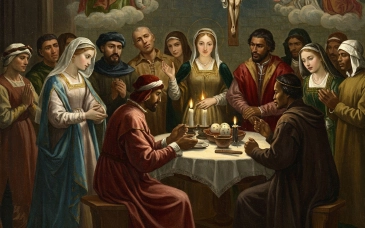Background
On January 11, 27 B.C. Octavian closed the doors of the temple of Janice to mark the return of peace to Rome. Five days later the Roman senate bestowed upon Octavian the title of Augustus Caesar. Augustus was the undisputed master of the world. His Empire ran from Spain and France to North Africa and Asia Minor. This vast country, populated by races of different colors, cultures, temperaments, and religions, was now for the first time brought under the sovereignty of one state and of one man. This ushered in the Roman Peace - PAX ROMANA. This brought about safer travel and trade. Their prosperity was evident in the cargoes of spices, silks, slaves, and all luxuries of a society given over to pleasure. There were a number of specific areas that were peculiar to the Roman peace that helped to maintain it.
The Roman Military

The Pax Romana or Roman Peace was enforced by the might of the military machines. Roman legions were stationed throughout the Roman Empire in colonies and towns to ensure the safety of the trade routes and her citizens. Philippi was such a military colony. There were twenty-five legions of three thousand men during Augustus reign posted around the border of the Empire. They also had a well equipped navy. This military machine was linked by a network of roads.


The Roman Roads


This is where the phrase 'all roads lead to Rome' came from. The roads went out from Rome to all the small provinces. There were the Appien Way, Egnation Way, and Agustin Way to name a few. They all helped in promoting communication and trade. In the provinces there were short roads which linked cities together like Jerusalem and Caesarea. They also linked provinces. There were also places to stay along these roads although they were primarily used for Roman soldiers. Along the way were post or pillars 8ft. high and 2ft. wide to indicate the mileage to the cities ahead. This encouraged people to travel under the protection of the police force set up as part of the army.


The Roman Language
Latin was the language of the Roman citizens and Greek the language of the people. Aramaic the language of Palestine and Hebrew the language of the Old Testament and Judaism.
For Further Study see Languages
The Roman Government
Augustus maintained this large Empire through a personal administration of governmental authority. But while in function he was a dictator he was very quiet in the way he governed. He desired to make life secure and tolerable for every class in the empire. While there was a strong central government there was also local independence. The Romans allowed the Jews to have their own justice. Jesus was tried by both the Roman and the Jewish courts.
Cities
These were either colonies settled by Roman citizens or army veterans loyal to Rome or municipalities which have found themselves taken over by the Romans. But Augustus allowed them to protect and govern themselves with Rome having the final say.
Free States
These were self governed client kingdoms surrounded by Roman territories and Rome would make deals with them.
Provinces
The Provinces were run by local independent government. A concilium would govern the provinces but they were led by men from every city who would only talked about the provinces business. All of these offices of government could only be filled by Roman Citizens.
Roman Citizenship
Although there were more Jews than Roman Citizens in the Roman Empire the Roman Citizens were 'the' men of the Empire. Acts 22:3, 22-29 Paul is addressing the Jews. They riot at his claim that he was sent to the Gentiles so the commander arrested Paul and took him into the barracks to be flogged. This was a common practice whether one was innocent or guilty. It was 39 lashes on the back. However a Roman Citizen was protected by Roman law. He could not be beaten. Notice the amazing transformation of the commanders attitude when he learns of Paul's free born citizenship.
Acts 16:22-24; 35-40 In Philippi Paul preaches on the river bank because there was no Jewish Synagogue (Need 10 families) Lydia was converted and when he had ruined the local fortune telling practice then the people rioted again. This time they were arrested and flogged. But Paul protested and exercised his Roman Citizenship.
Kinds Of Roman Citizens
Roman citizenship could be obtained in a number of ways.
1. By Decree of the Roman Empire. If you worked for the Government upon discharge you would receive a document making you a Roman Citizen. All the soldiers at 6 B.C. or the Pax Romana were Italians so by Paul's time there were a great number of these type of Roman Citizens. Some could obtain their Citizenship by bestowing a favour on some government official. By giving them money, supplies or products. Paul's father probably sewed tents for them.
2. Another way is to purchase your way to freedom. But it would cost a slave about $200.00 - $600.00 dollars (Canadian) a great amount.
3. You could be born in a family of a Roman Citizen and acquire your Citizenship that way.
Privileges Of Roman Citizens
1. Justice - only Roman Citizens could have the following benefits. He could not be flogged if he was untried. He had the right to appeal to Caesar and the governor had no right to block this. And finally no Roman Citizen could be crucified only beheaded.
2. A Roman Citizen could hold a government office, conduct business unhindered, travel freely throughout the empire.
Responsibilities Of A Roman Citizen
You had to pay pole tax or head tax. You had to speak Latin the language of the government and you must be available for jury duty. Every Roman Citizen had three names and a birth certificate. This was a waxed plate made of metal or wood carried on their person. This was also registered in their place of birth.
Paul was a participant in the Roman Empire. He was raised in Tarsus a commercial and intellectual center, trained in Jerusalem and ministered in many of the great centres of the Empire. His urbanised outlook is seen in his use of language drawn from city life.
See Background of Acts in The Scroll
General Contents
The book begins with a dedication to an unknown individual by the name of Theophilus. Luke 1:4 He may have been a man of some importance but is otherwise completely unknown to us. This period begins with the ascension of Jesus and ends with the death of the Apostle John. This period includes about seventy years and can be broken down into three periods.
1. Jewish Christian Church which covers about the first fifteen years. Peter is the central character during this period which centres around Jerusalem.
2. Gentile Christian Church takes in the next twenty-five years. Paul is the central character during this period which centres around Antioch.
3. Consolidation of the Church covers the last thirty years to the close of this period. John is the central character during this period which centres around Ephesus.
Importance
The importance of this work of God cannot be stress enough. Without it there would be a large part of the events of the Early Church missing. As is evident from a reading of the book the content is not merely historical but biographical in nature. Acts throws light on the life of God's people.
Purpose
The purpose of Acts is stated in Acts 1:8. ' But ye shall receive power, after that the Holy Ghost is come upon you: and ye shall be witnesses unto me both in Jerusalem, and in all Judaea, and in Samaria, and unto the uttermost part of the earth.' The remainder of the Book of Acts carries out this commission following the geographic description of our Lord. The Holy Spirit also seals the ministry by indwelling His people wherever salvation is visited upon God's people. Acts shows that there are no barriers to the Gospel touching men, women and children from all walks of life and every nation and station. The book concludes in Rome as the Gospel is preached unhindered here the centre of the then known world.
For Further Study See Background of Acts in The Scroll

